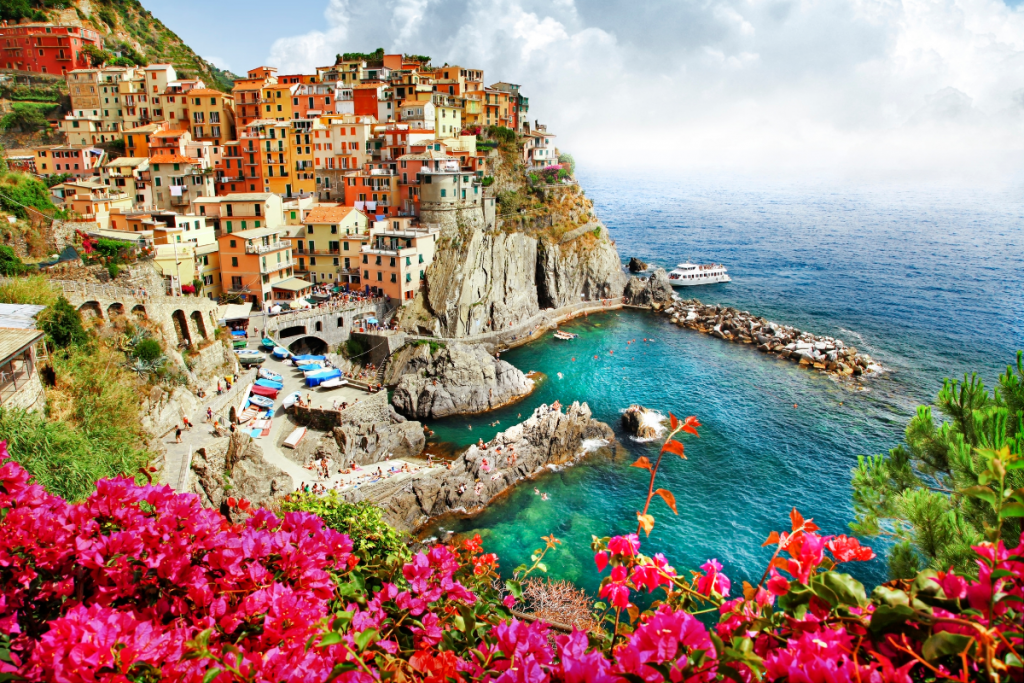🇮🇹Ready to start a new adventure across the Channel? If you’re planning a move to Italy, this guide will give you all the practical steps, updated costs, and streamlined advice you need for a smooth transition.

What should I know about living in Italy at a glance?
- Flag: 🇮🇹
- Population: 59 million
- Currency: Euro (EUR)
- Average salary: Around 33148€/year
- Live EUR ←→ Dollar: Use dynamic currency converters for the latest exchange rates
Reviewed by the worldometer, last updated in July 2025; European Central Bank Monetary Policy Department, last updated in July 2025; Trading Economics, last updated in July 2025.
How Much Does It Cost to Move Your Belongings to Italy?
The cost of moving to Italy depends on shipment size, transport method, and your point of origin. Typical market rates as of mid-2025 are:
| Shipment Method | Transit Time | Estimated Cost (EUR) |
| 20‑ft container | 3–6 weeks | €2,100–3,400 |
| 40‑ft container | 3–6 weeks | €3,500–5,200 |
| Air freight (per m³) | 2–8 days | €1,400–2,100 |
| Customs / VAT fees | — | €200–500 (if applicable) |
Reviewed by Freightos Market Analytics Team and Maersk Logistics Research Team, last updated in July 2025.
Use a real-time moving calculator for a tailored quote with ReloAdvisor.
Real-life case:
“I moved to Italy in May 2025 with around 30 cubic meters of belongings using a 40ft container. The total cost, including customs and delivery, was about €5,200. Everything arrived safely in just under four weeks.” — Elena M., moved in May 2025
Many people relocating to Italy choose to settle in one of the five most popular cities for newcomers, including Rome, Milan, Florence, Naples, and Bologna. These cities offer diverse career opportunities, rich cultural experiences, excellent public transportation, and vibrant international communities.
How to understand the cost of living in Italy?
As of mid-2025, the average cost of living in Italy for a single person reflects a modest yet comfortable lifestyle. Renting a one-bedroom apartment in a city center typically costs around €736 per month, depending on the location. Monthly grocery expenses generally fall near €405, covering basic food and household necessities. Utilities—including electricity, heating, water, and garbage—average about €159 per month, contributing to the overall affordability of daily living. For those relying on public transportation, a monthly pass costs approximately €154, giving access to well-connected city and regional networks. These figures are based on the most recent data from Numbeo, updated quarterly, and represent national averages for single-occupant households in Italy.
| Expense Category | Estimated Monthly Cost |
| Rent (1-bedroom, city center) | €736 |
| Groceries | €405 |
| Utilities (electricity, water, etc.) | €159 |
| Public Transport Pass | €154 |
Reviewed by Numbeo Data Quality Team, last updated in June 2025
How to Apply for a Visa and Meet Residency Requirements for Italy?
A visa is required for most non-EU/EEA nationals who wish to live, work, or study in Italy. Common visa categories include the National D-Visa (long-stay), which covers various purposes such as employment, study, family reunification, and self-employment. Each visa type has specific eligibility requirements, such as valid accommodation, proof of income, and a reason for stay longer than 90 days. Short-stay (Type C) Schengen visas are used for tourism or business stays under 90 days.
- Visa types and eligibility check: https://vistoperitalia.esteri.it/home/en
- Online application & consular booking: https://prenotami.esteri.it/
Reviewed by the Italian Ministry of Foreign Affairs and the Italian Immigration Desk (Sportello Unico per l’Immigrazione), last updated in July 2025
How to Access Healthcare and Insurance Options in Italy?
Italy has a universal public healthcare system called the Servizio Sanitario Nazionale (SSN), which provides residents with access to a wide range of medical services, including doctor visits, hospital care, and prescription medications, mostly free or at a low cost. Residents, including expatriates with legal residence, are entitled to register with the SSN and receive a health card (Tessera Sanitaria). While the public system covers most basic and emergency care, many people also opt for private health insurance to access faster services or additional treatments.
Health coverage is funded through taxes and regional contributions, and registration typically requires proof of residence and documentation. For those working legally in Italy, contributions to the SSN are generally deducted through payroll. Private insurance plans vary widely in coverage and price, complementing public care for elective or specialized treatments.
Reviewed by the Italian Ministry of Health and the Istituto Nazionale di Statistica (ISTAT), last updated in July 2025

How to Navigate the Housing Market as a Newcomer to Italy?
Renters in Italy typically pay a security deposit equal to two to three months’ rent and are required to provide documents such as proof of income, valid identification, and sometimes references from previous landlords. Rental agreements often last four years with the option to renew for two more years, and utilities are usually paid separately. Buyers should budget for additional costs including registration tax, notary fees, and agency commissions, which can add approximately 7%–10% to the property purchase price.
Popular residential neighborhoods for newcomers in major Italian cities include:
- Trastevere, Rome – Historic charm, lively atmosphere, and cobblestone streets
- Brera, Milan – Trendy, artsy, with boutiques and cafes
- Oltrarno, Florence – Authentic, artisan workshops, and scenic views
- Navigli, Milan – Vibrant nightlife centered around canals and restaurants
Reviewed by Idealista Research and Tecnocasa Market Insights, last updated in July 2025.
How to Understand Your Tax and Pension Obligations in Italy?
If you are a tax resident in Italy (generally if you spend more than 183 days per year in Italy or have your primary residence there), you are subject to tax on your worldwide income. Contributions to the Italian social security system (INPS) are mandatory for most employees and self-employed workers. Italy has numerous double taxation treaties designed to prevent you from being taxed twice on the same income in another country.
| Tax Component | Description | Notes |
| Income Tax | Tax on global income | Progressive rates: approx. 23%–43% |
| Social Security (INPS) | Mandatory contributions for pensions and welfare | Paid by both employer and employee |
| Double Tax Treaties | Avoid double taxation | Agreements with 80+ countries |
Reviewed by the Italian Revenue Agency (Agenzia delle Entrate), last updated in April 2025.
How to Comply with Customs and Duty Rules When Moving to Italy?
When relocating to Italy, you may be eligible for duty-free import of your used personal belongings under the Italian customs regulations, provided the items have been owned and used for at least 6 months prior to import and are intended for personal use. You will need to submit a detailed inventory list along with documents such as proof of change of residence (e.g., residency registration), and a bill of lading or airway bill.
New items or commercial goods are generally subject to import duties and VAT according to their category and value. To avoid delays, fines, or unexpected charges, ensure your customs declaration is complete, accurate, and submitted either before arrival or at the port of entry.
Reviewed by the Italian Customs Agency (Agenzia delle Dogane e dei Monopoli), last updated in February 2025.
Real-life case:
“When I moved from Berlin to Rome, I carefully prepared an itemized list of all my used household goods and submitted it to customs upon arrival. Thanks to Italy’s transfer of residence rules, my belongings cleared customs smoothly without additional duties.” — Luca R.

How to Manage Pet Relocation When Moving to Italy?
Pets entering Italy must comply with specific health and documentation requirements depending on their species and country of origin. Dogs, cats, and ferrets must have a valid rabies vaccination and a microchip for identification. Additionally, a veterinary health certificate issued shortly before travel (usually within 10 days) is required.
Pets coming from non-EU countries may also need a veterinary certificate endorsed by the relevant authorities in the country of origin. Certain animals might be subject to additional checks or quarantine upon arrival.
It is important to notify Italian customs and veterinary authorities in advance and carefully follow the European Union’s pet travel regulations to ensure smooth entry. Using a professional pet relocation service and preparing documentation early helps minimize stress and avoids compliance issues.
Reviewed by the Italian Ministry of Health (Ministero della Salute), last updated in March 2025.
How to Import a Car and Swap Your Driver’s Licence in Italy?
Imported vehicles must be declared to Italian Customs (Agenzia delle Dogane e dei Monopoli). If you’re arriving from outside the EU, your vehicle may be subject to import duties, VAT, and must comply with EU safety and environmental regulations. Vehicles imported permanently into Italy must undergo a technical inspection and be registered with the Italian DMV (Motorizzazione Civile). Documentation required typically includes the original title, proof of ownership, and conformity certification (if available).
Foreign driver’s licenses are valid for short-term stays (up to 1 year for many nationalities). If you establish legal residency in Italy, you’ll need to exchange your license for an Italian Patente di Guida. Depending on your country of origin, you may need to pass written and driving exams, although many bilateral agreements waive these requirements.
Reviewed by the Italian Ministry of Infrastructure and Transport and the Agenzia delle Dogane, last updated in July 2025.
How to Open a Bank Account and Obtain a Tax ID in Italy?
To open a bank account in Italy, you’ll typically need a valid passport or national ID, proof of Italian address (such as a rental contract or utility bill), and a Codice Fiscale (Italian Tax Code). This tax identification number is essential for most legal and financial activities in Italy, including employment and healthcare. Most major banks in Italy—such as UniCredit, Intesa Sanpaolo, and BNL—offer accounts for non-residents and newcomers, often with multilingual support and online services in English.
If you are not yet a resident, some banks still allow you to open a non-resident account, which has slightly different conditions. Once you gain legal residence, you may upgrade to a standard resident account for broader services, such as overdrafts and loans.
The Codice Fiscale can be obtained through the Agenzia delle Entrate (Italian Revenue Agency) and is also required when signing rental contracts or registering for public healthcare.
Reviewed by the Bank of Italy and the Agenzia delle Entrate, last updated in July 2025.
Where can I find tools and more resources before moving?
For further guidance, make use of the volume calculator, book a video survey, or explore comprehensive guides for Spain and the Netherlands with ReloAdvisor.



